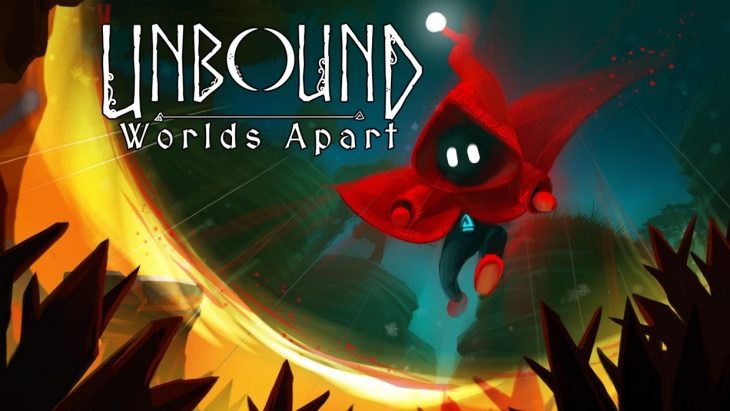
The humble indie puzzle-platformer is arguably the most saturated genre in the entire games industry. From the early Xbox 360 days (when major companies first started propping up indie games) all the way until now, the puzzle-platformer has always seemed to be one of the go-to genres for small teams looking to break into the game industry.
Unfortunately, the sheer number of games that populate this crowded genre means that the vast majority of them usually never get noticed by the wider gaming community. For every smash hit darling like Hollow Knight, Trine, or Little Nightmares, there are dozens more that come and go with little to no fanfare.
Based on how little buzz I’ve seen about Unbound: Worlds Apart, it sadly looks like it will fall into the latter category. This is kind of a shame, because while Unbound isn’t the most inventive or groundbreaking indie puzzle-platformer on the market, it’s definitely pretty good at what it sets out to do.
Unbound: Worlds Apart
Developer: Alien Pixel Studios
Platforms: Windows PC (Reviewed), Linux, Mac, Nintendo Switch
Release Date: July 28th, 2021
Players: 1
Price: $19.99 USD
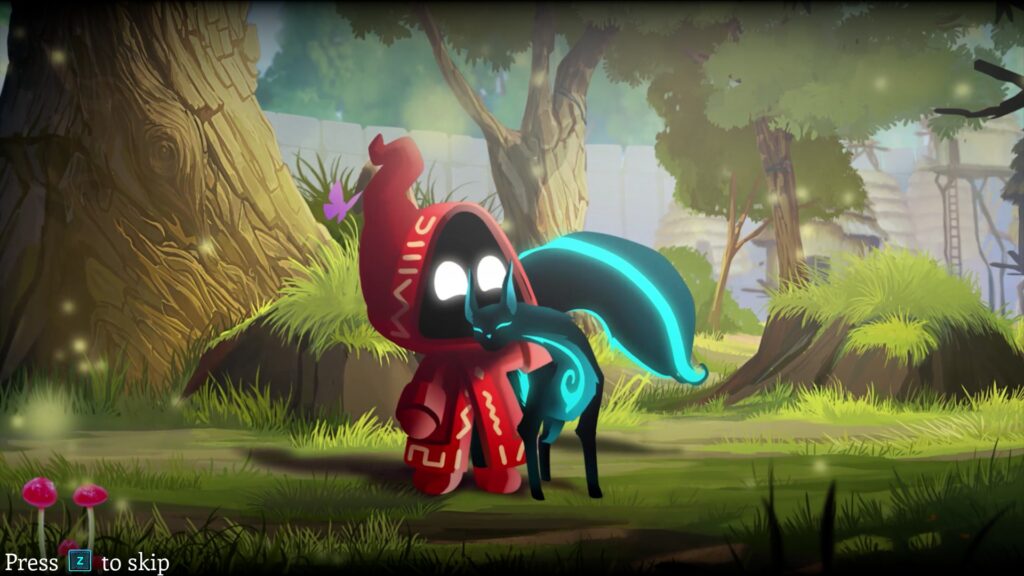
Unbound: Worlds Apart is set in the peaceful land of Vaiya, one of many realms that inhabit a vast multiverse connected by magical portals. You play as Soli, a young mage growing up in the quiet village of Rhu, who is somewhat ostracized by his peers due to his mysterious abilities.
During a routine ritual performed by the elders, your village is invaded by demonic forces from another plane that are determined to consume and corrupt your realm like countless others before it. The survivors of the attack have barricaded themselves in a cavern behind mystical barriers.
Soli, who has now been gifted with the ability to create small portals between the realms, must use his powers to save Vaiya and drive back the demons threatening his home. Unbound‘s story and narrative aren’t exactly the most original out there, but it gets the job done and serves its purpose of giving you context for traveling around a variety of vibrant and exotic locations.
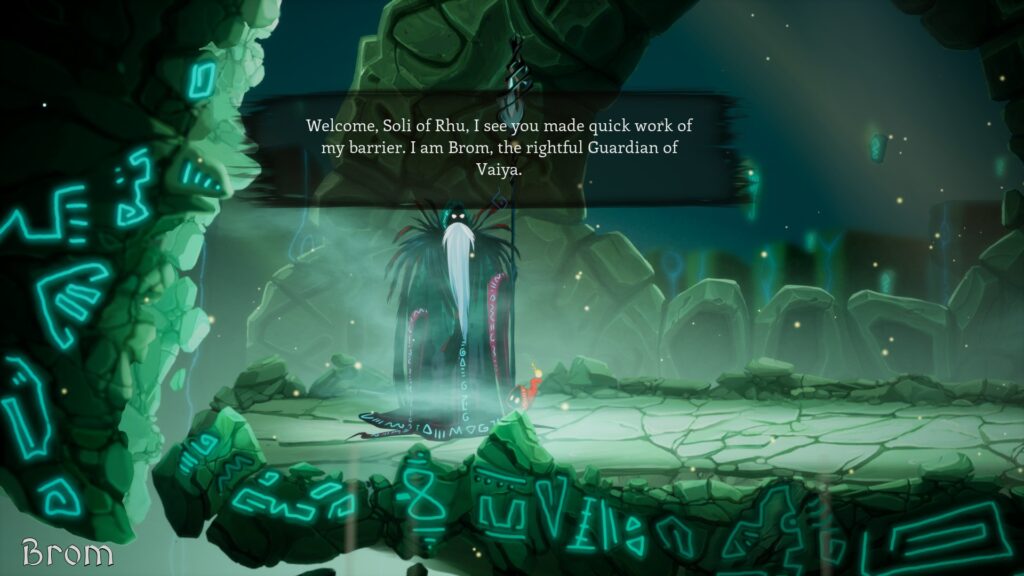
The game’s lore is further elaborated on by rescuing lost villagers hidden around the map. Each rescued villager adds text to a large ancient tome, which gradually gives you insight into Vaiya, the otherworldly creatures threatening your home, and the greater multiverse they exist within. Rescuing them all, and completing an optional and very challenging side quest, rewards you with the game’s “good” ending.
Unbound is structured like your typical Metroidvania-style puzzle-platformer. There are several large maps for you to explore full of puzzles, obstacles, and even a handful of hidden secret areas here and there. As you progress through the game, you’ll unlock abilities like a double jump and dash that allow you to reach previously inaccessible areas.
As I mentioned before, Unbound‘s puzzles and a good deal of its platforming is based around portals. These portal mechanics are less about creating interdimensional doorways you travel through, and more about swapping planes to alter the environment around you. Exactly how these portals work vary from area to area, and there are about 10 different variations of the mechanic throughout the game.
The most basic form of portal creates a small bubble around you that looks into another plane. This might reveal platforms you can jump on, transform spikes into climbable vines, or turn an enemy into a block you can move around to get to a higher place or solve a simple pressure pad puzzle.
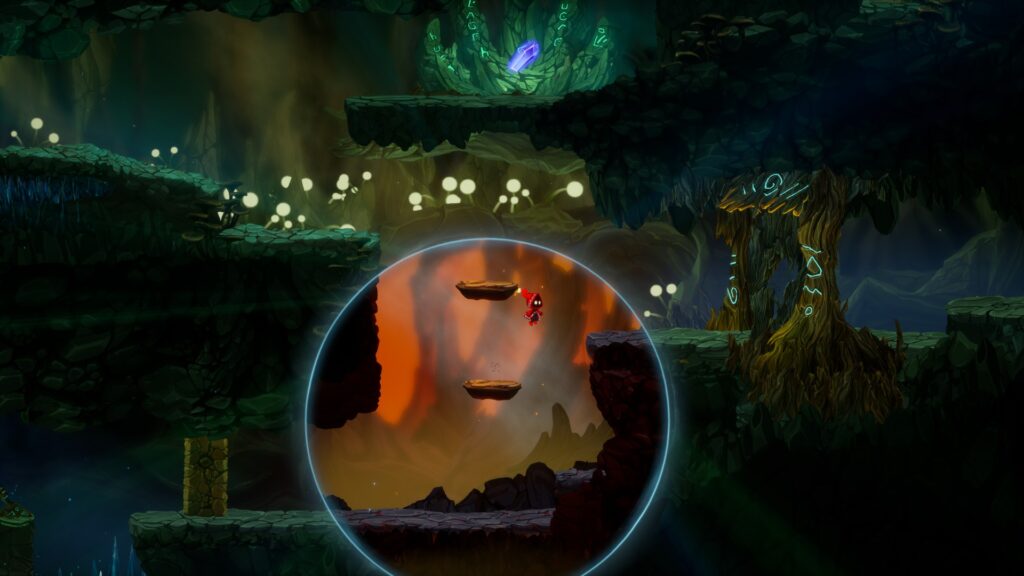
Later on, you’ll traverse areas with more complicated portal mechanics. One reverses gravity, allowing you to walk on the ceiling or “float” by repeatedly tapping the portal key.
Another turns the fireball-spitting plant hazards into bubble shooters, allowing you to jump into the bubble to zip over obstacles. One particularly memorable segment involved the portal becoming a pulsing bubble that expands when you stand still, and shrinks when you move.
Besides just platforming and solving puzzles, the world is populated with a variety of demonic creatures. The portals affect these beasts in their own unique ways. Some might become larger and more aggressive when under the influence of a portal. Others simply don’t even exist in Vaiya, such as during a segment where you have to escape a giant centipede that only appears when you open a portal.
Unfortunately for you, this area is full of rocks that disappear when you open a portal, so you have to quickly open and close your portals to get past the obstacles blocking your path while escaping the rampaging centipede monster.
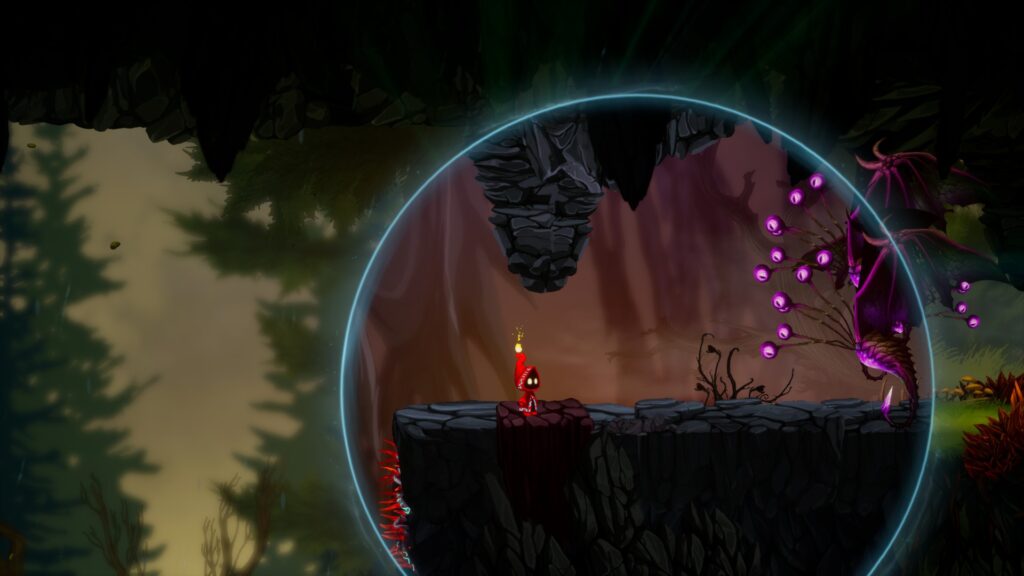
Regardless of how the portals affect enemies, Soli has no way to directly fight them. You’ll need to use your wits, reflexes, and knowledge of how each portal works to escape certain death at the jaws of creatures like giant demon bird monsters, or floating mouths full of serrated teeth that move ridiculously fast.
The actual puzzles themselves aren’t exactly headscratchers. Most of the time its extremely obvious what you actually need to do to progress further, it’s just a matter of reflexes and timing. While Unbound isn’t exactly a precision platformer per se, it’s a rather fast and challenging one that requires quick thinking and reflexes to avoid death.
And that death will come quite frequently. Luckily, Unbound is a pretty fair game for the most part. Checkpoints are very frequent, and usually placed right before or after a puzzle or platforming segment. Load times are also quite fast, so you are never out of the action more than a second or two.
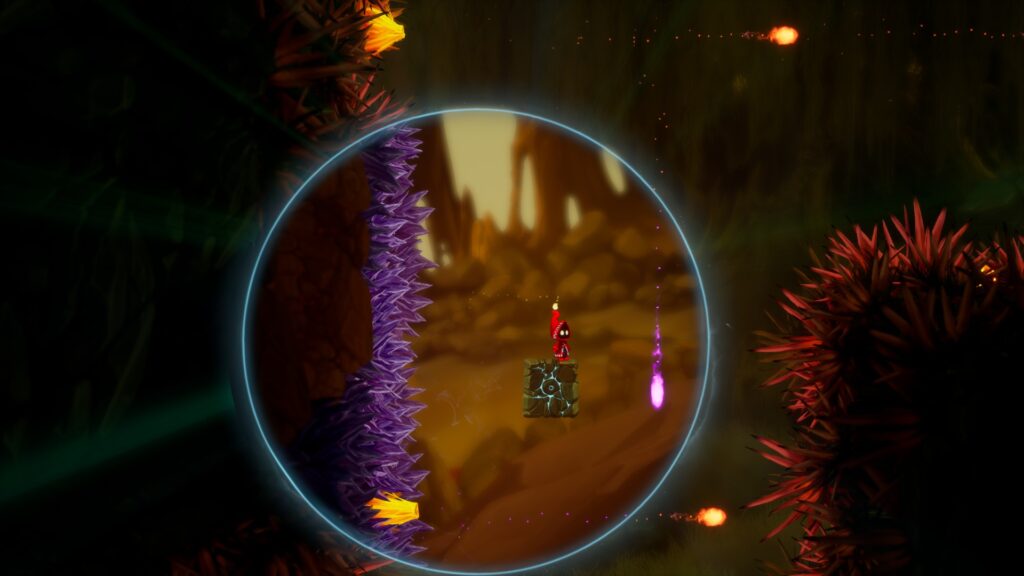
I say “mostly” fair because there are a handful of lengthier segments without checkpoints. These can be quite frustrating as they are also on the challenging side. The optional area suffers from this more than anywhere else, and the devs have specifically said this is intentional because this area is meant to push your reflexes and ability to think fast while under pressure.
Personally, I found the most annoying segments to be the ones where you have to repeatedly open and close portals to float or avoid enemies. This often involves tapping the trigger so quickly you’ll feel like you are on the range trying to recreate the fire rate of an MG-42 with a semi-automatic while still maintaining accuracy.
I also experienced some glitches related to the respawn system. If you die too many times in rapid succession, the game enters a death loop for a few seconds where you die upon respawning. Luckily, this glitch has always resolved itself quickly enough, making it more of a minor annoyance than anything else.
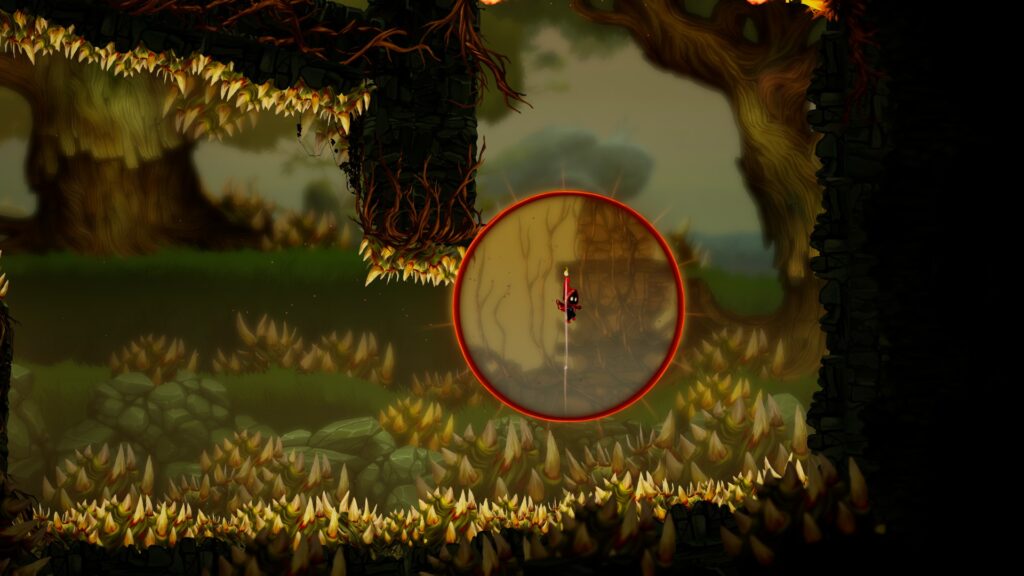
As you’ve probably noticed from the screenshots, Unbound is a very vivid and whimsical looking game. It uses a hand-drawn art style, leading to some very striking backgrounds and environments.
The NPC and monster designs are also great, and the game has a pleasant soundtrack that acts mostly as ambient noise to build the mood. The animations are fairly simple overall, but still pretty smooth, helping to ensure that the platforming feels tight and responsive.
Considering how many indie puzzle-platformers use pixel art, many of which are extremely simple and lazy; it’s always nice to see one come along with a charming and thoughtfully designed hand-drawn aesthetic.
Unbound: Worlds Apart will take you about five hours to complete, and you can add a bit more to that timer by trying to find all the villagers and doing the other optional stuff to get the true ending. Most of the secrets are pretty easy to find, and the map doesn’t have too many branching or maze-like pathways, so exploration isn’t a huge part of the game overall.
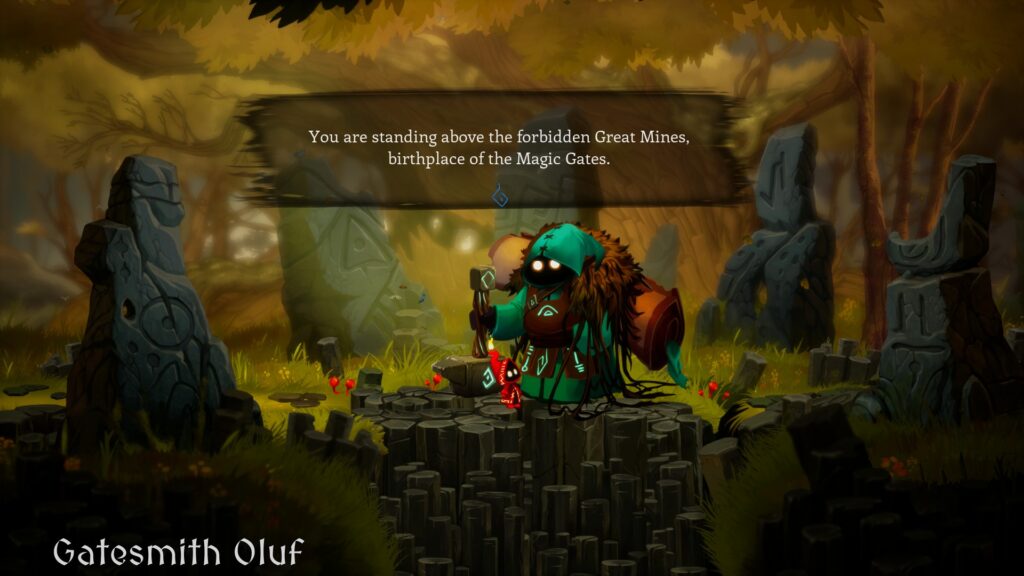
It might not be the most groundbreaking or innovative game in the genre, but Unbound: Worlds Apart is still a fun and challenging puzzle-platformer. The various portals are each unique and interesting, and lead to some moderately clever little puzzles. The platforming is tight and responsive, and there are some tougher segments that offer a decent degree of challenge.
If you are looking for a bright and colorful puzzle-platformer with some nice environment and NPC designs, then Unbound: Worlds Apart will probably scratch your itch for a few hours. What it lacks in mechanical and narrative originality, it makes up for by just being an all around solid and enjoyable experience while it lasts.
Unbound: Worlds Apart was reviewed on Windows PC using a review code provided by Alien Pixel Studios. You can find additional information about Niche Gamer’s review/ethics policy here.